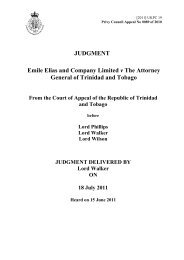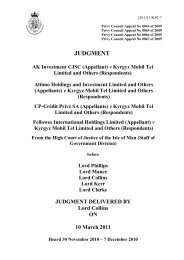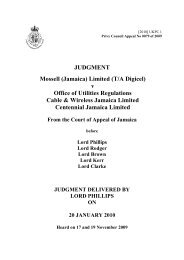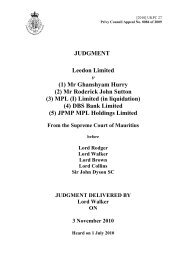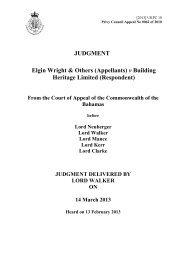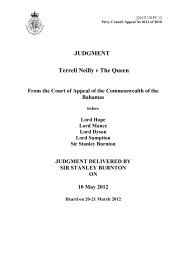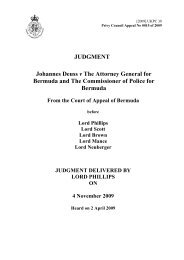Keith O'Connor v (1) Paul Haufman Percival Piccott (2) Eugene ...
Keith O'Connor v (1) Paul Haufman Percival Piccott (2) Eugene ...
Keith O'Connor v (1) Paul Haufman Percival Piccott (2) Eugene ...
Create successful ePaper yourself
Turn your PDF publications into a flip-book with our unique Google optimized e-Paper software.
[2010] UKPC 4<br />
Privy Council Appeal No 2009 of 0035<br />
JUDGMENT<br />
<strong>Keith</strong> O’Connor v (1) <strong>Paul</strong> <strong>Haufman</strong> <strong>Percival</strong><br />
<strong>Piccott</strong> (2) <strong>Eugene</strong> Adolphus <strong>Piccott</strong><br />
From the Court of Appeal of Jamaica<br />
before<br />
Lord Saville<br />
Lord Clarke<br />
Sir Jonathan Parker<br />
JUDGMENT DELIVERED BY<br />
Sir Jonathan Parker<br />
ON<br />
17 February 2010<br />
Heard on 30 November 2009
Appellant<br />
James Dingemans QC<br />
<strong>Paul</strong> Letman<br />
Mrs Pamela Gayle<br />
(Jamaican Bar)<br />
(Instructed by MA Law<br />
LLP)<br />
Respondent<br />
Dr Lloyd Barnett<br />
(Jamaican Bar)<br />
(Instructed by David<br />
Thomas Solicitors)
SIR JONATHAN PARKER :<br />
1. Mr <strong>Keith</strong> O’Connor, the appellant on this appeal, is the freehold owner of a plot of<br />
land comprising four flats and situate at 26 Silverdene Drive, Three Oaks Gardens in the<br />
Parish of St Andrew, Jamaica. His title is duly registered in Volume 968 Folio 681 of the<br />
Register Book of Titles. Mr <strong>Paul</strong> <strong>Piccott</strong> and Mr <strong>Eugene</strong> <strong>Piccott</strong> (son and father,<br />
respectively), the respondents to this appeal, claim to be contractually entitled to purchase<br />
one of those flats, namely Flat 3.<br />
2. In the action (the reference to the record of which is 074/97), which was commenced in<br />
the Supreme Court of Judicature of Jamaica as long ago as 2 May 1997, the respondents seek<br />
against the appellant specific performance of a written Agreement for the purchase of Flat 3<br />
from the appellant at the price of $96,000. It is alleged in paragraph 2 of the Statement of<br />
Claim that the appellant’s attorney, Mr Melbourne Silvera, acted in the transaction as the<br />
appellant’s agent.<br />
3. No Defence having been filed by the appellant, the respondents applied by motion for<br />
judgment in default of Defence. The respondents’ affidavit in support of the motion<br />
identifies the Agreement sued on as being an Agreement made in March or April 1984<br />
between Mr Silvera and a Mr Tomlinson of the one part and the respondents of the other part<br />
for the sale of Flat 3 to the respondents at the price of $96,000.<br />
4. The motion was heard by Ellis J on 21 May 1998, By his order of that date, Ellis J<br />
ordered specific performance “of the Agreement for Sale made between the parties” and<br />
granted consequential relief.<br />
5. On the footing that the order of Ellis J was a judgment in default of Defence, the appellant<br />
applied by motion to set the order aside on the ground (among others) that Ellis J had not<br />
been made aware of an order dated 22 May 1990 and made by Harrison J in an earlier action<br />
brought by the appellant against Mr Silvera (the reference to the record of which was<br />
E353/89). In his affidavit in support of the motion the appellant contended that Harrison J’s<br />
order had rendered any agreement for the sale of Flat 3 by him to Mr Silvera “void”.<br />
6. By order dated 22 March 2001 Cooke J dismissed the motion on the ground (as stated in<br />
paragraph 2 of the order) that it was “misconceived as a Judge of co-ordinate jurisdiction<br />
cannot set aside a judgment on motion decided on the merits” (emphasis supplied). The<br />
appellant appealed Cooke J’s order to the Court of Appeal of Jamaica on the ground that the<br />
judge had erred in law in holding that he had no jurisdiction to set aside the order of Ellis J,<br />
since the matter had not been heard on the merits: i.e. it was a judgment in default of<br />
Defence.<br />
7. On 7 April 2006 the Court of Appeal dismissed the appellant’s appeal. The Court of<br />
Appeal held that the order of Ellis J was indeed a judgment in default of Defence and not (as<br />
Cooke J had held) a judgment on the merits. It was satisfied that it had a discretion under the<br />
Civil Procedure Rules to set Ellis J’s order aside, but it declined to exercise that discretion in<br />
Page 1
the appellant’s favour on the ground that he had deliberately ignored the procedural<br />
requirements, having taken a decision not to defend the action.<br />
8. The appellant now appeals to the Board.<br />
9. The matter has a long and confusing history, and, without intending any criticism of<br />
counsel appearing before the Board, it is a regrettable fact that many of the relevant<br />
documents are missing from the Record of Proceedings which has been placed before the<br />
Board. In consequence, it is simply not possible for the Board to attempt to set out a<br />
complete account of the history of this matter. What follows, therefore, is no more than a<br />
summary of the history as it appears from the documents which the Board has seen and from<br />
such assistance as counsel have been in a position to give. As will appear from that<br />
summary, there has been a plethora of litigation relating to the alleged contractual entitlement<br />
of various parties to purchase Flat 3 and/or to charge rent for its occupation. For<br />
convenience and clarity, each of the various actions will hereafter be referred to by its<br />
reference number.<br />
10. The story begins, at least so far as the Record of Proceedings goes, with the Agreement<br />
dated 27 June 1984 and made between Mr Tomlinson and Mr Silvera of the one part and the<br />
respondents of the other part (“the 1984 Agreement”). By the 1984 Agreement Mr<br />
Tomlinson and Mr Silvera agreed to sell Flat 3 to the respondents for $95,000 (not $96,000 as<br />
alleged in the Statement of Claim in 074/97). A deposit of $9,500 was expressed to be<br />
payable on the signing of the agreement, and vacant possession was to be given on<br />
completion. Completion was to take place on or before 30 September 1984, but in the event<br />
the sale was never completed.<br />
11. By an Agreement made in about April 1988 between the respondents of the one part and<br />
Ms Maisie Hines of the other part (“the 1988 Agreement”) the respondents agreed to sell Flat<br />
3 to Ms Hines for $240,000. A deposit of $10,000 was payable on the signing of the 1988<br />
agreement, and vacant possession was to be given on completion. Completion was to take<br />
place within 60 days from the date on which a registrable Instrument of Transfer together<br />
with a Certificate of Title was tendered by the Respondents to Ms Hines. According to the<br />
Statement of Claim filed by Ms Hines in a later action (E135/91) commenced by her against<br />
the respondents, she paid the respondents $20,000 towards the purchase price and, by<br />
agreement with the respondents, entered into occupation of Flat 3 paying a monthly rental.<br />
12. On 27 September 1989 the appellant commenced an action (E353/89) against Mr<br />
Silvera. The originating summons in E353/89 sought the determination of the question<br />
whether Silvera (sc. acting as the appellant’s agent) could “validly” sell Flat 3 on the<br />
appellant’s behalf to third parties without the appellant being advised to seek independent<br />
advice, and sought declaratory relief to the effect that a purported purchase of Flat 3 by<br />
Silvera from the appellant was “void”.<br />
13. In his supporting affidavit, the appellant deposed that in 1983, at Mr Silvera’s office, he<br />
had signed a form of agreement for the sale of Flat 3 in which the names of the purchasers<br />
was left blank, and that he later learned that the purchasers were Mr Tomlinson and Mr<br />
Silvera. The appellant went on to state that during the discussion leading to “the purported<br />
sale in 1983” Mr Silvera failed to advise him to seek independent advice, or to advise him of<br />
the sale price or any of the other terms and conditions of “the intended sale”.<br />
Page 2
14. In his affidavit in opposition, Mr Silvera deposed that in 1983 he had discussed the sale<br />
of Flat 3 with an estate agent, Mr Charles Hylton, and that he had informed Mr Hylton that he<br />
would try to find someone who would join with him in purchasing Flat 3 for $225,000 as he<br />
was unable to proceed with the purchase on his own. In the event, according to his<br />
evidence, he arranged with Mr Tomlinson (via Mr Tomlinson’s mother) that he and Mr<br />
Tomlinson would together purchase Flat 3. He denied that there were any blanks in the form<br />
of Agreement signed by the appellant. He went on to refer to a sale of Flat 3 to the first<br />
respondent (notwithstanding that, as stated above, both respondents were named as<br />
purchasers in the 1984 Agreement) at the price of $95,000, stating that $80,500 of that sum<br />
remained unpaid.<br />
15. On 22 May 1990 Mr Justice Harrison made an order in Chambers granting certain of the<br />
declaratory relief sought by the appellant, including a declaration that “the purported sale was<br />
void”. It appears to the Board that the reference to “the purported sale” can only be a<br />
reference to a sale by the appellant to Mr Silvera, or possibly to Mr Silvera and Mr<br />
Tomlinson (i.e. a reference to the 1984 Agreement).<br />
16. On 4 September 1990 the appellant’s then attorney, Mr Garth Lyttle, wrote to the first<br />
respondent in the following terms:<br />
“Re proposed sale of Flat 3 …<br />
You will recall that at our meeting at my office, I pointed out that there was a serious<br />
problem with the title to the above premises as these lands belonging [sic] to<br />
Kingston and St Andrew.<br />
As a result of this encroachment, the Sub-division Plan has not been approved and<br />
consequently our client is not in a position to pass the title to you and is [therefore]<br />
inviting you to come in to discuss the matter with us, with a view of returning to you<br />
your deposit.<br />
You will also recall that by our letter dated 21 st June, 1990 we advised you that the<br />
sum of $18,850.33 was owing to our client by way of arrears.<br />
We now make a formal demand that within ten (10) days from the receipt of this<br />
letter you pay to our client, through us, the said sum of $18,850.00 representing<br />
arrears of rent, failing which our instructions are to commence litigation against you<br />
without further notice.”<br />
17. In October 1990 the respondents attempted to cancel the 1988 Agreement on the ground<br />
that they were unable to make title to Flat 3.<br />
18. On 5 April 1991 Hines & Co., Ms Hines’ attorneys, wrote to <strong>Keith</strong> Brooks, the<br />
respondents’ then attorney, giving the respondents notice to complete the 1988 Agreement.<br />
19, On 26 April 1991 Ms Hines commenced action E135/91 against the respondents,<br />
claiming specific performance of the 1988 Agreement.<br />
20. In 1992 the first respondent commenced an action in the Half Way Tree Resident<br />
Magistrates Court (2887/92) against Ms Hines claiming arrears of rent in respect of her<br />
occupation of Flat 3. This was the first of a number of actions (possibly as many as seven)<br />
Page 3
commenced by the first respondent against Ms Hines for alleged arrears of rent, alternatively<br />
for possession of Flat 3, none of which actions has as yet succeeded. The claim in action<br />
2887/92 was dismissed by order of Her Honour Ms Elise Francis on 2 March 1995.<br />
21. In the meantime, on 4 May 1993 the appellant entered into an Agreement with Ms Hines<br />
(“the 1993 Agreement”) for the sale of Flat 3 to her at the price of $240,000, with vacant<br />
possession on completion (in fact, as already stated, Ms Hines was already in occupation). It<br />
is not in dispute that Ms Hines has paid the purchase price of $240,000 in full; indeed, a<br />
receipt for the full purchase price is included in the Record of Proceedings.<br />
22. As from the signing of the 1993 Agreement Ms Hines has paid rent for her occupation of<br />
Flat 3 to the appellant, rather than to the respondents. Ms Hines also asserts that since 1993<br />
she has expended a substantial sum on improving Flat 3.<br />
23. On 2 May 1997 the respondents commenced the present action (074/97), claiming<br />
against the appellant specific performance of “an Agreement” whereby the appellant agreed<br />
to sell Flat 3 to them at the price of $96,000. Reference has already been made to their<br />
Statement of Claim, which is dated 18 October 1997. However it is not clear to the Board<br />
whether the single page Statement of Claim which has been included in the Record of<br />
Proceedings represents the whole of the document. The fact that it does not include any<br />
prayer for relief, and that the text finishes at the foot of the single page, suggest that a further<br />
page or pages may be missing. Through no fault of theirs, counsel were unable to assist the<br />
Board on this point.<br />
24. As stated earlier, no Defence was filed in 074/97 by the appellant, and on 22 January<br />
1998 the respondents issued a notice of motion seeking judgment for specific performance in<br />
default of Defence.<br />
25. In paragraph 9 of their affidavit in support of the notice of motion the respondents stated<br />
that as a result of the order of Harrison J in E353/89 the ownership of Flat 3 “reverted” to the<br />
appellant, but that “a part of the Judgment recommended that the status quo in respect of the<br />
sale of the properties for which an Agreement for Sale was entered should remain and enure<br />
to the benefit of the Purchasers”. The Board has not seen any judgment of Harrison J<br />
leading to his order, and is accordingly not in a position to comment on that statement.<br />
26. Paragraph 10 of the respondents’ affidavit reads as follows:<br />
“10. That this position has been recognized and adopted by the Attorney-at-Law for<br />
[the appellant] as shown in his letter dated September 4, 1990 …”<br />
27. In paragraph 11 of their affidavit the respondents asserted that to date they had paid<br />
$42,543.00 on account of the purchase price (be that price $95,000 or $96,000) and as a result<br />
were given possession of Flat 3. In paragraph 12 they stated that they had requested the<br />
appellant to complete “the agreement”, but that “there seems to be a plan to sell to another<br />
purchaser”. The Board finds the respondent’s reference to a plan to sell to another purchaser<br />
is somewhat strange, given that the respondents were by that time well aware of the interest<br />
of Ms Hines as purchaser under the 1993 Agreement.<br />
28. Mr Lyttle appeared before Ellis J at the hearing of the motion for judgment on 21 May<br />
1998, but it appears that no affidavit had been filed in opposition to the motion. In the result,<br />
Page 4
as stated above, Ellis J made the order which has given rise to the present appeal. It reads as<br />
follows (so far as material):<br />
“UPON this action coming on for hearing this day and after hearing Dr Lloyd Barnett<br />
Attorney-at-Law instructed by Miss Leila Parker, Attorney-at-Law for the<br />
[respondents] and Mr Garth Lyttle, Attorney-at-Law for [the appellant] IT IS<br />
HEREBY ADJUDGED:<br />
1. that the [respondents] be granted Specific Performance of the Agreement for<br />
Sale made between the parties that [Flat 3] be transferred to the [respondents].<br />
2. that the [appellant] deliver up to the [respondents] … the relevant<br />
unencumbered duplicate Certificate of Title along with an Instrument of<br />
Transfer within thirty (30) days of this order being made.<br />
3. that if the [appellant] fail to abide by the terms [hereof]:<br />
a. the Registrar of the Supreme Court be empowered to execute a valid<br />
Transfer to the [respondents]<br />
b. …..<br />
4. that the costs of this action be agreed or Taxed and paid by the [appellant]….”<br />
29. On 12 July 1999 Ms Hines applied to be joined as a defendant in action 074/97 and to<br />
set aside the judgment of Ellis J, but that application was in due course refused. Whatever<br />
may have been the reasons for that refusal (and the Record of Proceedings contains no record<br />
of the refusal, nor were counsel able to assist in this respect), on the information before it the<br />
Board cannot conceive of any good reason why, given Ms Hines’ interest as a contracting<br />
purchaser under both the 1988 Agreement and the 1993 Agreement, and given the fact that<br />
(according to her evidence) she had paid $20,000 to the respondents on account of the<br />
purchase price of $240,000 under the 1988 Agreement and that she had indisputably paid to<br />
the appellant the full purchase price of $240,000 under the 1993 Agreement, she should not<br />
have been joined as a defendant in action 074/97 in order to assert her own claims in relation<br />
to Flat 3 as against the respondents and the appellant. This is an aspect of the matter to<br />
which the Board will return later in this judgment.<br />
30. Also in 1999 the first respondent commenced another action against Ms Hines claiming<br />
arrears of rent and possession of Flat 3. This action was commenced in the Sutton Street<br />
Resident Magistrates Court and was numbered 4003/99. Judgment in action 4003/99 was<br />
delivered by Her Honour Ms Mangatal in about August 2001 following a 10-day trial. In the<br />
course of the trial oral evidence was given by the first respondent, by Ms Hines, by the<br />
appellant and by his attorney Mr Lyttle.<br />
31. In a full and reasoned judgment, HH Ms Mangatal referred to Mr Lyttle’s evidence that<br />
the appellant did not attend to give evidence at the hearing of before Mr Justice Ellis on 21<br />
May 1998, and that “therefore judgment was entered in favour of the [first respondent]”.<br />
She goes on to record Mr Lyttle as stating that at that hearing “[t]he matter was not actually<br />
tried, and no evidence was heard”.<br />
32. In the result, HH Ms Mangatal expressed herself not to be satisfied on the balance of<br />
probabilities that the respondents were entitled to possession of Flat 3 or to claim<br />
compensation from Ms Hines whether as rent or as any other form of payment during the<br />
relevant period. She went on to say that this was so because (among other things) the<br />
Agreement referred to in the order of Ellis J had not been put in evidence; Ms Hines was not<br />
Page 5
a party to the action 074/97; and in any event the order of Ellis J was not a judgment in<br />
default but a judgment by consent (albeit Ms Hines could not have consented to it as she was<br />
not a party to the action). HH Ms Mangatal accordingly dismissed the action.<br />
33. With respect to HH Ms Mangatal, the Board finds it hard to see how the order of Ellis J<br />
could be described as, in any sense, a judgment by consent.<br />
34. In the meantime, having failed in her attempt to be added as a defendant in action<br />
074/97, on 20 January 2000 Ms Hines commenced action H005/00 against the appellant,<br />
claiming specific performance of the 1993 Agreement. The Record of Proceedings does not<br />
reveal how far (if at all) that action has progressed.<br />
35. On 7 March 2000 the appellant applied to set aside the order of Ellis J in the present<br />
action (074/97). In his affidavit in support of that application the appellant stated that during<br />
the trial of action 2887/92 the first respondent had approached him and offered to purchase<br />
Flat 3, but that he (the appellant) had told the first respondent that he had already sold Flat 3<br />
to Ms Hines. The affidavit went on to refer to the 1993 Agreement, exhibiting a receipt for<br />
the full purchase price paid by Ms Hines.<br />
36. The appellant also relied in support of his application on affidavits by Mr Lyttle and Ms.<br />
Hines.<br />
37. Mr Lyttle’s evidence was that at the time of “the hearing of the said suit” – a reference<br />
to the hearing before Ellis J – he was not aware of some of the issues which should have been<br />
brought to the judge’s attention; in particular, he was unaware of action 2887/92 and of the<br />
order made in that action by HH Ms Elise Francis. He went on to say that had he been aware<br />
of that order he would have brought it to the attention of the judge. He stated that he was<br />
aware of action E353/89, and hence (presumably) of the order of Harrison J in that action, but<br />
he made no express reference to that order in his affidavit.<br />
38. Ms Hines’ evidence was that following Harrison J’s order in action E353/89 she had<br />
received a letter from Mr Lyttle, on behalf of the appellant, informing her of the order and<br />
instructing her to pay no further rent to the first respondent. Thereafter, according to her<br />
affidavit, she paid rent to the appellant. Her affidavit went on to confirm that she paid the<br />
purchase price under the 1993 Agreement in full to the appellant. She stated that she had<br />
been living in Flat 3 since the 1993 Agreement, although she had not as yet been registered as<br />
proprietor of Flat 3 due to delays at the Registry in approving the subdivision of the<br />
registered title (which, as noted earlier, included all four flats). In paragraph 16 of her<br />
affidavit Ms Hines said this:<br />
“16. That the [respondents] knew and have known from as far back as 1993 that<br />
[Flat 3] did not belong to [the appellant] as during the trial of [action] 2887/92<br />
some time in 1993 it was revealed to the … court and the [first respondent] that<br />
I had purchased the property from [the appellant] as the relevant Agreement for<br />
Sale [i.e. the 1993 Agreement] and receipt were exhibited in the Trial.”<br />
39. In paragraph 19 of her affidavit Ms Hines contended that the order of Ellis J had been<br />
obtained “without full disclosure and by misrepresentations to the Court”.<br />
Page 6
40. On 22 March 2001 Cooke J dismissed the appellant’s application to set aside the order<br />
of Ellis J, on the ground that (as had been submitted on behalf of the first respondent) the<br />
order was not a default judgment but a judgment on the merits (see paragraph 6 above).<br />
41. The appellant then applied for a stay of execution of the order of Ellis J and an extension<br />
of time for appealing. In his affidavit in support of that application he stated that his reasons<br />
for not attending the hearing before Ellis J were that he had previously informed the first<br />
respondent that he had sold Flat 3 to Ms Hines, and that the effect of the order of Harrison J<br />
in action E353/89 was that Flat 3 had “reverted” to him as the true owner.<br />
42. An affidavit in support of the application was also sworn by Mrs Pamela Gayle, who had<br />
represented the appellant before HH Ms Mangatal at the trial of action 4003/99 and before<br />
Cooke J. In her affidavit, Mrs Gayle confirmed that at the hearing before Cooke J the<br />
respondents’ attorney Dr Lloyd Barnett (who also appears for them on this appeal) submitted<br />
that Ellis J had made his order “after the matter had been heard on the merits”. In paragraphs<br />
7 and 8 of her affidavit Mrs Gayle said this:<br />
“7. That I indicated to the court that this was inaccurate as the matter had not been<br />
heard on the merits.<br />
8. That further attempts to elaborate were cut short and met with the response that<br />
the Motion was misconceived as a Judge of coordinate jurisdiction could not<br />
set aside a Judgment on Motion decided on the merits.”<br />
43. The hearing of the appellant’s appeal took place in December 2005. Mrs Gayle, for the<br />
appellant, submitted that Cooke J had erred in law in holding that he had no jurisdiction to set<br />
aside the order of Ellis J, repeating the submission she had made to Cooke J that the matter<br />
had never been heard on the merits and that under the Civil Procedure Code there was clear<br />
jurisdiction to set aside that order. She submitted that there had been a failure to disclose to<br />
Ellis J the order made by Harrison J in action E353/89, and that Ellis J did not have before<br />
him all the material necessary to enable him to reach a decision on the matter. Dr Lloyd<br />
Barnett, for the respondents, submitted that there was no inconsistency between the order of<br />
Harrison J in E353/89 and the order of Ellis J in the present action (074/97).<br />
44. On 7 April 2006 the Court of Appeal dismissed the appeal. The leading judgment was<br />
delivered by McCalla JA (Ag.), with which Panton JA and Smith JA agreed.<br />
45. After summarising the history of the matter, which she rightly described as unusual and<br />
complicated, McCalla JA held that the order of Ellis J was a default judgment and not a<br />
judgment on the merits. In the paragraph of her judgment numbered 33 (which in fact<br />
follows immediately after paragraph 30) she said this:<br />
“There is no doubt that Ellis J was seized with jurisdiction to hear the matter. I am of<br />
the view that having regard to the circumstances outlined above, the matter was not<br />
decided on the merits. Although counsel [Mr Lyttle] appeared for the appellant at<br />
the hearing of the Motion, the matter could not have been decided on its merits as no<br />
defence had been filed. However, in my opinion, Cooke J was correct in exercising<br />
his discretion to refuse to set aside the judgment and extend the time to file a defence.<br />
The appellant had deliberately ignored the procedural requirements, having taken a<br />
decision not to defend the matter. He could not have been ignorant of the Order<br />
Page 7
made by Ellis J as Counsel had represented him at the hearing of the Motion ….<br />
Thereafter he took no steps, in a timely manner, to seek to set aside the Order.”<br />
46. McCalla JA then turned to rule 13.3 of the Civil Procedure Rules (“CPR”), which<br />
provides as follows (so far as material):<br />
“13.3<br />
(1) …., the court may set aside a judgment entered under Part 12 only if the<br />
defendant –<br />
(a) applies to the court as soon as reasonably practicable after finding out that<br />
judgment had been entered;<br />
(b) gives a good explanation for the failure to file … a defence …; and<br />
(c) has a real prospect of successfully defending the claim.<br />
(2) ….”<br />
47. Having held (in paragraph 31 of her judgment) that the requirements of rule 13.3 had not<br />
been satisfied in this case, McCalla JA then referred to rule 1.2 of the CPR, which provides<br />
that in exercising any discretion given to it by the CPR the court must give effect to the<br />
overriding objective of dealing with cases justly (see ibid. rule 1.1). She continued (in<br />
paragraph 32 of her judgment):<br />
“Having considered all the circumstances, I see no basis on which this Court should<br />
exercise its discretion to assist the appellant to avoid the consequences of his<br />
deliberate inaction. It would not be in accordance with the overriding objective of<br />
the CPR which enables the court to deal with cases justly.”<br />
48. The appeal was accordingly dismissed.<br />
49. Before the Board, Mr James Dingemans QC (leading Mr <strong>Paul</strong> Letman and Mrs Gayle,<br />
for the appellant) points out that the CPR came into force, subject to transitional provisions,<br />
on 1 January 2003 (that is to say, after the hearing before Cooke J on 22 March 2001); and<br />
that the rules in force at the date of the hearing before Cooke J were those contained in the<br />
Civil Procedure Code (“the Code”).<br />
50. Mr Dingemans referred the Board to section 258 of the Code, which provided as follows<br />
(so far as material):<br />
“Any judgment by default … may be set aside by the Court or a Judge upon such<br />
terms as to costs or otherwise as such Court or Judge may think fit.”<br />
51. Mr Dingemans also referred the Board to the transitional provisions in Part 73 of the<br />
CPR, pointing out that these provisions (like the corresponding provisions of the English<br />
Civil Procedure Rules) do not expressly deal with the application of the new rules to appeals.<br />
He invites the Board to adopt the general approach of the English courts when confronted<br />
with the same issue arising out of the introduction of the English Civil Procedure Rules (on<br />
26 April 1999). That general approach is described by Lord Woolf MR in McPhilemy v.<br />
Times Newspapers Ltd [1999] 3 All ER 775 as follows (at 792f-g):<br />
Page 8
“The transitional provisions … do not expressly deal with appeals. However, the<br />
general approach should be obvious. In reviewing a decision made prior to 26 April<br />
1999, this court will not interfere after that date if it would not have done so if the<br />
appeal had been heard prior to that date. This court only interferes with a decision<br />
of a court below if that decision was wrong. If the decision was not wrong prior to<br />
26 April 1999, it does not become wrong, for the purposes of an appeal, as a result of<br />
the subsequent coming into force of the rules. However, if the decision is one with<br />
which this court would have interfered prior to 26 April 1999, in deciding what order<br />
should be made for the future, this court will take into account, in particular, Pt 1 of<br />
the rules [in which the overriding objective is set out].”<br />
52. Mr Dingemans points out that the procedural rules which were in force in England prior<br />
to 26 April 1999 (the Rules of the Supreme Court) contained a rule in substantially the same<br />
form as rule 258 of the Code. He referred us in this context to the decision of the Privy<br />
Council in Strachan v. The Gleaner Co Ltd [2005] 1 WLR 3204 on an appeal from the Court<br />
of Appeal of Jamaica. The judgment of the Board was delivered by Lord Millett. At<br />
paragraph 21 of his judgment Lord Millett said this:<br />
“A default judgment is one which has not been decided on the merits. The courts<br />
have jealously guarded their power to set aside judgments where there has been no<br />
determination on the merits, even to the extent of refusing to lay down any rigid rules<br />
to govern the exercise of their discretion: see Evans v. Bartlam [1937] AC 473, 480<br />
where Lord Atkin (discussing the provisions of English rules in substantially the<br />
same terms as section 258) said:<br />
‘The principle obviously is that, unless and until the court has pronounced a<br />
judgment upon the merits or by consent, it is to have the power to revoke the<br />
expression of its coercive power where that has only been obtained by a failure to<br />
follow any of the rules of procedure.’” (Emphasis supplied)<br />
53. Accordingly, submits Mr Dingemans, notwithstanding the introduction of the CPR prior<br />
to the hearing in the Court of Appeal, section 258 remains of central importance in this case.<br />
54. Turning to the merits of the appeal, Mr Dingemans submits that the Court of Appeal<br />
failed to take into account the rights of Ms Hines as contracting purchaser of Flat 3; and that<br />
in the light of the history of this matter, and in particular the order of Harrison J on E353/89,<br />
an order for specific performance in favour of the respondents would be unworkable. He<br />
submits that the Court of Appeal gave excessive weight to the appellant’s admitted failures to<br />
meet procedural requirements; alternatively that in dismissing the appeal it failed to achieve<br />
the overriding objective of dealing with cases justly.<br />
55. For the respondents, Dr Lloyd Barnett accepts that the overriding objective applied to<br />
the hearing in the Court of Appeal, pointing out that in dismissing the appeal the Court of<br />
Appeal expressed itself as exercising a general discretion (see paragraph 32 of the judgment<br />
of McCalla JA quoted in paragraph 47 above). However, he submits that the appellant<br />
provided no valid basis on which the Court of Appeal could properly have exercised its<br />
discretion in his favour.<br />
56. As to any suggested inconsistency between the order of Ellis J and the order of Harrison<br />
J in action E353/89, Dr Lloyd Barnett seeks to rely on Mr Lyttle’s letter dated 4 September<br />
Page 9
1990 (quoted in paragraph 16 above) as a ratification or adoption by the appellant of his<br />
contract with Mr Silvera (or, as the case may be) with Mr Silvera and Mr Tomlinson.<br />
57. Both Mr Dingemans and Dr Lloyd Barnett have made their submissions to the Board on<br />
the basis that the order of Ellis J was a default judgment, and the Board is content to proceed<br />
on that basis.<br />
58. The Board accepts the submission of Mr Dingemans as to the general approach to be<br />
adopted by the Court of Appeal in this case, as set out by Lord Woolf MR in McPhilemy (see<br />
the extract from his judgment quoted in paragraph 51 above). It follows that, whether one<br />
applies section 258 of the Code or rule 1.2 of the CPR, the result is the same: viz. that in<br />
deciding what order to make for the future the Court of Appeal was required to have regard to<br />
the overriding objective of dealing with cases justly.<br />
59. In the judgment of the Board, in deciding in effect to confirm Ellis J’s order for specific<br />
performance the Court of Appeal failed to have sufficient regard to the overriding objective.<br />
The Board reaches this conclusion for essentially two reasons.<br />
60. In the first place, the Court of Appeal appears to have focussed exclusively on the<br />
procedural failures of the appellant, without having paid any regard to the rights of Ms Hines<br />
as a third party who has entered into contracts for the purchase of Flat 3 from the respondents<br />
and from the appellant, and who is substantially out of pocket having paid the full price of<br />
$240,000 to the appellant pursuant to the 1993 Agreement and $20,000 to the respondents on<br />
account of the purchase price under the 1988 Agreement.<br />
61. Secondly, given the history of the matter, and in particular the terms of Harrison J’s<br />
order in E353/89, an order for specific performance in favour of the respondents appears to<br />
the Board to be wholly unworkable in practice and a recipe for yet further litigation. The<br />
Board notes that Dr Lloyd Barnett seeks to rely on Mr Lyttle’s letter dated 4 September 1990<br />
as a ratification or adoption of a sale of Flat 3 by the appellant to Mr Silvera (or, as the case<br />
may be, to Mr Silvera and Mr Tomlinson). However, that is not an issue which has as yet<br />
been litigated and the Board cannot comment further on it beyond saying that on the face of it<br />
the respondents will face considerable difficulties in pursuing it.<br />
62. The Board considers that the only practicable way in which this matter can be<br />
progressed to a conclusion is by the three contesting parties (that is to say the appellant, the<br />
respondents and Ms Hines) being joined in a single action in which all the issues between<br />
them can be litigated to judgment. Since Ms Hines is not a party to the action and does not<br />
appear on this appeal, the Board is not in a position to give any procedural directions<br />
affecting her. However, the Board expresses the hope that the three parties will lose no time<br />
in taking the necessary procedural steps to achieve that end.<br />
63. For the above reasons, the Board will humbly advise Her Majesty that the appeal should<br />
be allowed, and the order of Ellis J dated 21 May 1998 set aside. The parties should make<br />
any submissions on costs in writing within 14 days.<br />
Page 10


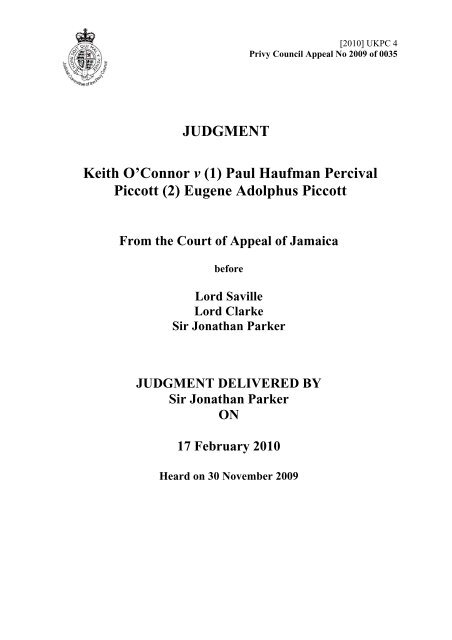
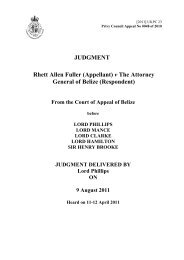
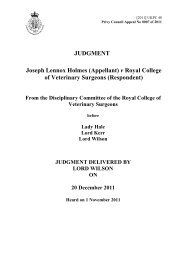
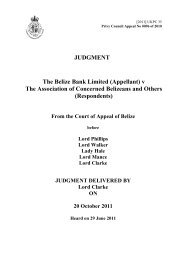
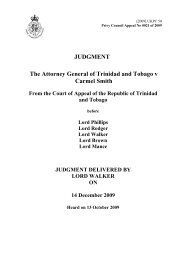
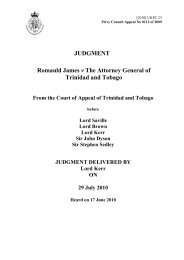
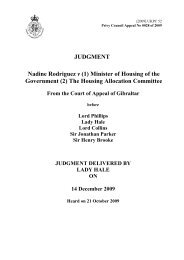
![[2011] UKPC 10 - Judicial Committee of the Privy Council](https://img.yumpu.com/23644185/1/184x260/2011-ukpc-10-judicial-committee-of-the-privy-council.jpg?quality=85)
